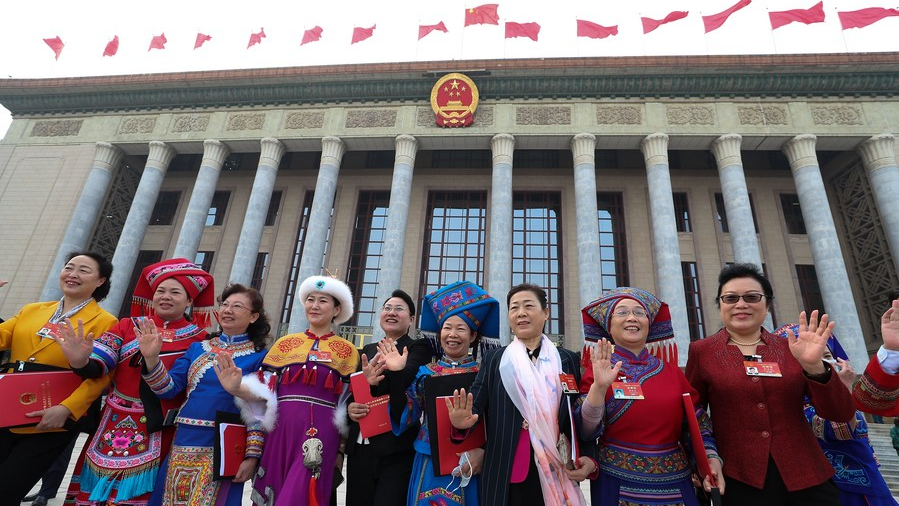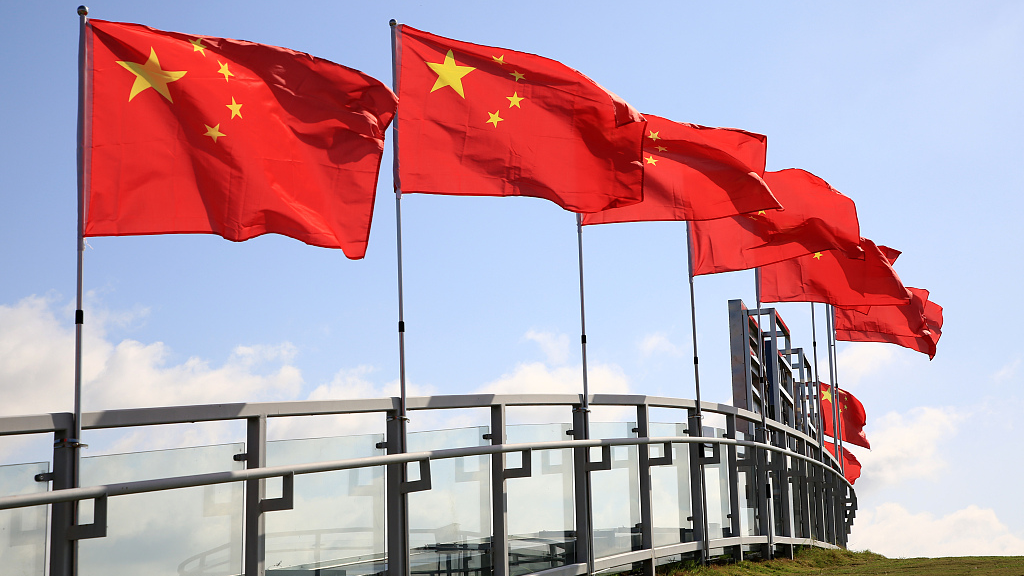
Deputies to the 13th National People's Congress (NPC) leave the Great Hall of the People after the closing meeting of the fourth session of the 13th NPC in Beijing, capital of China, March 11, 2021. /Xinhua
Deputies to the 13th National People's Congress (NPC) leave the Great Hall of the People after the closing meeting of the fourth session of the 13th NPC in Beijing, capital of China, March 11, 2021. /Xinhua
Editor's note: Josef Gregory Mahoney is a professor of politics at East China Normal University. The article reflects the author's opinions and not necessarily the views of CGTN.
All too often when liberal democrats discuss democracy, they conflate mechanisms with principles. And when they do discuss principles, they are less than candid regarding the overwhelming privileges accorded private property – which they often erroneously equate with personal property in opposition to public property.
Indeed, in classical economic terms, private property rights are merely the rights to own the means of production. Consequently, whether the one percent or 10 percent of the population, those who actually enjoy such rights are an absolute minority in a system that puts their interests over the masses.
Such a democracy is a farce, and nowhere in the world is it more so than in the United States – that country that above all others likes to wag a self-righteous finger at China. But who can forget that in addition to privileging the wealthy above all, that America's "moral high ground" was built on genocide of the Native Americans, African slavery, conquest and appropriation of Mexican lands and subsequently exploitation and suppression of Latino asylum seekers and migrant labor, gender discrimination, and various forms of colonialism, imperialism and hegemony around the world.
This is to say, neither historically, nor contemporaneously, neither nationally nor internationally, has American democracy been particularly democratic, and yet, it promotes itself as the patron of democracy everywhere.
The American Lie, despite all the proof to the contrary, is still strangely effective, perhaps because its promoted by business interests, including media and tech companies, that are deeply complicit with the system that benefits them. Thus, if one suggests that China by comparison is democratic, or perhaps even more democratic than the U.S., the response in the West and a few misguided pockets in the East would be complete derision.
This is understandable in part because propaganda and misinformation are the norm in the West, especially when discussing China. But it's also because the West rarely seriously considers its own undemocratic practices, past and present. Instead, it generally focuses on mechanisms that appear democratic but are unable in many cases to produce real democratic results qua real social progress, including social progress that isn't derived from exploiting someone else, be they workers, women, minorities or foreign nations.
This is also due, again, to conflating mechanisms with principles, even though the principle is expressed in the original conception of the word. Indeed, the word "democracy" comes from Greek, "dēmokratia," which combined "dēmos/ the people" with "kratia/power, rule." Thus, the principle is that people rule, and whatever mechanism is devised to assure this, it must actually promote the rule of the people.
It has long been a Marxist argument that bourgeois, liberal democracy is inconsistent with the rule of the people or people's democracy. Consequently, one sees many different concepts and mechanisms developed in the Marxist tradition to correct this problem, including "dictatorship of the proletariat," "democratic centralism," "intra-party democracy," "whole-process people's democracy" and many others, including universal suffrage guaranteeing individual rights to vote for candidates at the local level, who then in turn vote for candidates at the next level above, and so on.
But these are mechanisms and concepts, and while they relate to our discussion, they are not principles. Although "democracy is a good thing," Party intellectual and dean of the School of Government at Peking University Yu Keping famously wrote in the essay of the same title, more importantly, one should pursue politics without confusing abstract and unrealized ideals with the hard facts of material reality. Thus, one should instead focus on democratic principles that actually empower the masses in meaningful ways, politically and economically, and that ensure their well-being improves.
What are the principles of Chinese democracy? In fact, there are many, including those that have evolved through time along with those that have appeared more recently. If we made a list, the first to note is national sovereignty, of securing the nation against foreign aggression and domination, followed closely with national rejuvenation.

China's national flags flutter in the breeze. /CFP
China's national flags flutter in the breeze. /CFP
It would include clean and effective governance that follows the rule of law – guided by science and people-oriented. It would promote operational efficiency but include attention to public sensitivities and embrace consultative practices. It would increasingly prioritize improving the environment and green development as a philosophy of national development and global well-being.
It would support and protect minorities with affirmative action policies but suppress separatists undermining national sovereignty. It would vigorously protect public health and respond aggressively to threats, whether disease outbreaks or natural disasters. It would promote socialist development with policies effectively raising hundreds of millions out of poverty, and it would eliminate extreme poverty.
It would provide public education and, instead of consistently shortchanging students, would instead limit excessive tendencies in education that push children too hard. It might employ market mechanisms but counteract these when necessary with an effective regime of macro-controls, including regulating and limiting the power of major corporations, whether private or state-owned, for national well-being.
It would sustain historical memory, be grounded in the material present, and engage in long-term planning with a socialistic telos – a democracy now that charts its progress from a less democratic past towards a more democratic future.
It would promote democracy in international relations through multilateralism and principles of non-interference and reciprocity; and when possible and appropriate, engage in peacekeeping and provide other forms of aid.
If one is guided in political practice by principles that aim to increase real democracy instead of mechanisms that are always hamstrung in the first instance with the first principle of bourgeois democracy – private property rights – and if one can eschew the first principle of American foreign relations – hegemony – then one can argue that one is on the path of real democracy.
This is the argument that is being advanced in Beijing today with the concept of "whole-process people's democracy," which expresses the principles I've listed above and demonstrates how these values are guiding policymaking and helping China reach the forefront of human development.
Consequently, it's ironic that as China has become more democratic at home and abroad, as it has done more to improve the well-being of its people without always calculating how it can exploit others, that Western critics allege the opposite is happening.
And it is doubly ironic given the conditions facing democracy in the West today, particularly the U.S., where even the mechanisms of voting are increasingly at risk, where some political leaders allege undemocratic practices and yet call for and even attempt undemocratic coups, where inflation associated with economic mismanagement is effectively a regressive tax, where poverty is increasing, where real wages are declining, where drug and alcohol addictions are increasing, where suicides and violence are on the rise, where more than 700,000 have died of COVID-19, where minorities remain at risk of police brutality, where everyone is endangered by an unchecked gun culture, and so on.
And what of American democracy internationally, given claims that it's supporting and promoting democracy globally? Ask the Afghans, the Iraqis, the Palestinians, the Kurds, or even the Europeans about American democracy.
Indeed, all this talk about democracy from Washington, but whether George Bush, Barack Obama, Donald Trump or Joe Biden, America's penchant for unilateralism and desire for hegemony has not declined, even if its capacity to impose both globally has, along with its democracy at home.
(If you want to contribute and have specific expertise, please contact us at opinions@cgtn.com.)

